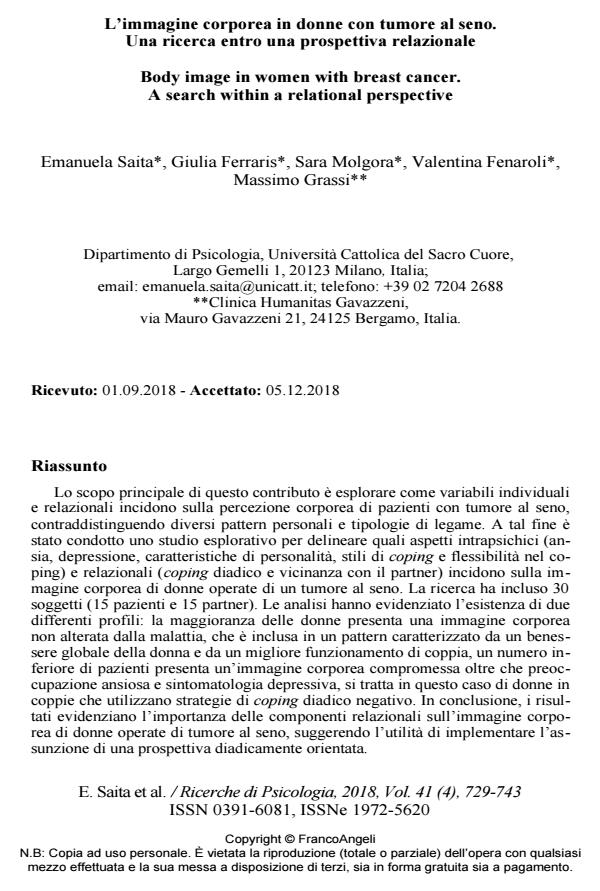L’immagine corporea in donne con tumore al seno. Una ricerca entro una prospettiva relazionale
Titolo Rivista RICERCHE DI PSICOLOGIA
Autori/Curatori Emanuela Saita, Giulia Ferraris, Sara Molgora, Valentina Fenaroli, Massimo Grassi
Anno di pubblicazione 2019 Fascicolo 2018/4
Lingua Italiano Numero pagine 15 P. 729-743 Dimensione file 208 KB
DOI 10.3280/RIP2018-004011
Il DOI è il codice a barre della proprietà intellettuale: per saperne di più
clicca qui
Qui sotto puoi vedere in anteprima la prima pagina di questo articolo.
Se questo articolo ti interessa, lo puoi acquistare (e scaricare in formato pdf) seguendo le facili indicazioni per acquistare il download credit. Acquista Download Credits per scaricare questo Articolo in formato PDF

FrancoAngeli è membro della Publishers International Linking Association, Inc (PILA), associazione indipendente e non profit per facilitare (attraverso i servizi tecnologici implementati da CrossRef.org) l’accesso degli studiosi ai contenuti digitali nelle pubblicazioni professionali e scientifiche.
Lo scopo principale di questo contributo è esplorare come variabili individuali e relazionali incidono sulla percezione corporea di pazienti con tumore al seno, contraddistinguendo diversi pattern personali e tipologie di legame. A tal fine è stato condotto uno studio esplorativo per delineare quali aspetti intrapsichici (an-sia, depressione, caratteristiche di personalità, stili di coping e flessibilità nel co-ping) e relazionali (coping diadico e vicinanza con il partner) incidono sulla im-magine corporea di donne operate di un tumore al seno. La ricerca ha incluso 30 soggetti (15 pazienti e 15 partner). Le analisi hanno evidenziato l’esistenza di due differenti profili: la maggioranza delle donne presenta una immagine corporea non alterata dalla malattia, che è inclusa in un pattern caratterizzato da un be-nessere globale della donna e da un migliore funzionamento di coppia, un nume-ro inferiore di pazienti presenta un’immagine corporea compromessa oltre che preoccupazione ansiosa e sintomatologia depressiva, si tratta in questo caso di donne in coppie che utilizzano strategie di coping diadico negativo. In conclusio-ne, i risultati evidenziano l’importanza delle componenti relazionali sull’immagine corporea di donne operate di tumore al seno, suggerendo l’utilità di implementare l’assunzione di una prospettiva diadicamente orientata.
Parole chiave:Immagine corporea, cancro al seno, ansia, depressione, coping diadico.
- Dyadic Profiles of Couples Coping With Body Image Concerns After Breast Cancer: Preliminary Results of a Cluster Analysis Emanuela Saita, Giulia Ferraris, Chiara Acquati, Sara Molgora, Antonia Sorge, Francesco Valenti, Massimo Maria Grassi, Denise Vagnini, in Frontiers in Psychology 869905/2022
DOI: 10.3389/fpsyg.2022.869905
Emanuela Saita, Giulia Ferraris, Sara Molgora, Valentina Fenaroli, Massimo Grassi, L’immagine corporea in donne con tumore al seno. Una ricerca entro una prospettiva relazionale in "RICERCHE DI PSICOLOGIA " 4/2018, pp 729-743, DOI: 10.3280/RIP2018-004011